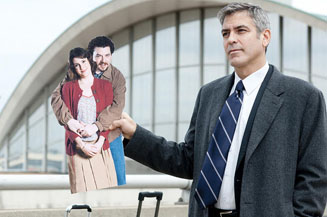Book vs. Movie: Up in the Air
By Russ Bickerstaff
December 25, 2009
Throughout the novel we are exposed to the perspective of Ryan Bingham - a man who Kirn seems to be attempting to paint as a charmingly cold individual with flaws and emotions hidden underneath that make him endearing. Kirn doesn't do a terribly good job of making Bingham the kind of traveling companion one feels terribly interested in spending 300 pages with. The novel works well as a book to be read on planes, busses or any other form of mass transit because Bingham feels like some mildly offensive guy whose cell phone conversation you're overhearing on a flight from one place to the next. He's not the kind of guy you'd want to hang out with once you got off the plane. This really shouldn't be a problem, though. Any halfway decent narrative can overcome the abrasiveness of the main character.
The cold lifelessness of a white-collar figure from a first person perspective was captured with much more appeal in a much more vivid and brilliantly realized novel in Brett Easton Ellis' American Psycho from 1991. (It's a far better book than its admittedly competent film adaptation in 2001.) Ellis' protagonist Patrick Bateman has a cold charm about him that dissolves into a staggeringly interesting depiction of mental collapse in pinstripes. Bingham travels a similar route by the end of Up In The Air, but it isn't a particularly coherent journey for him and his psychological make-up ultimately feels like a tacked-on subplot.
As for the nomadic nature of the modern executive, that subject matter was captured much more brilliantly in the travel segments of Chuck Palahniuk's 1996 novel Fight Club (which was turned into a 1999 David Fincher film that was surprisingly every bit as good.) Palahniuk's very concise observations on corporate travel sparkle with insight spoken through the mouth of Tyler Durden. In 300 pages of travel, Bingham never manages the level of insight Durden achieves in the brief span of the book that focuses on his journeys.
There are probably better examples of novels with more accomplished first-person perspective novels with a male protagonist than Fight Club and American Psycho, It is interesting to note, however, that though both of those novels were turned into fairly decent films, neither film managed to improve significantly on the novels they were based on. Though it may not have been a terribly accomplished novel, Kirn's Up In The Air could serve as a really good initial study for a far better film written and directed by Jason Reitman.
The Movie
From the beginning, it's pretty clear that the film does a much better job of making Bingham likable than the book does. Much of the success of this is due to George Clooney's performance in the role. Clooney has a respectable pragmatism about him that carries a remarkable amount of charm. The book never really establishes why Bingham is as good as he is at what he does. Clooney's performance in the role artfully renders the spirit behind the intellect of the character and that goes a long way towards making him the type of guy you don't mind spending a couple of hours in the theatre with.
Continued:
1
2
3
|
|
|
|




